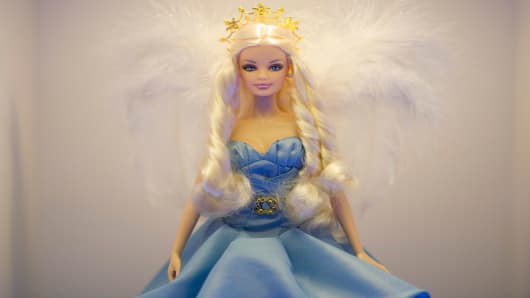Mattel's Barbie, the world's most recognizable doll, seems to be losing her iconic appeal with sales declining last year at a time when global sales of dolls and accessories jumped by $770 million, according to market research firm Euromonitor.
Barbie is facing increasing competition and a broadening of the U.S. market that accounts for over 30 percent of the dolls and accessories sector, Euromonitor said in a report.
"Mattel has gained a significant 40 percent share of the U.S. market, although this has been at the expense of Barbie's category share," Robert Porter, toys and games analyst at Euromonitor said, referring to new and increasingly popular Mattel brands such as Monster High and American Girl.
Barbie's worldwide sales were down 3 percent in 2012 from a year earlier, while American Girl saw an 11 percent gain, according to Mattel. Barbie, however, remains the number one brand in the sector, accounting for nearly 23 percent of market share globally in 2012, which is down by 1 percent from 2011, Euromonitor said.
Mattel, the world's biggest toymaker, last week reported a weaker-than-expected second-quarter profit of $73.3 million, down 23 percent from a year earlier on the fading luster of Barbie, which saw sales plunge for a fourth straight quarter, down 12 percent.
Showing her age?
Fifty-four year old Barbie, which has dominated the market and been Mattel's core brand in the doll category, appears to be losing some of her appeal among younger girls, Porter said.
He added that a new generation was identifying itself more with products such as Monster High that feature dolls that are supernatural beings and have no "defined ethnic" background.
(Read more: Accessories are king in retail)
"Much of this is likely to be down to shifting household demographics in the U.S., which are increasingly non-white, moving to a more diverse and multi-cultural landscape," he said. "With the U.S. being the largest market for dolls and accessories by some distance, the erosion of Barbie's share there has had a significant impact on the overall growth of Barbie globally."
Mattel said Barbie has annual sales of about $1.3 billion, compared with $500 million for Monster High, which was launched just three years ago.
Emerging markets embrace Barbie
But to say that Barbie has had her day would be "presumptuous," according to Porter, who says the doll is still in high demand in emerging markets.
"Developed markets are embracing the newer Monster High brand, which is subsequently cannibalizing Barbie's share, whereas in the emerging markets Barbie continues to maintain a dominant share," Porter said.
(Read more: Barbie: Where Fashion Week and Toy Fair collide)
Barbie's market share in emerging markets such as Romania and Mexico, which have the highest market share held by Barbie in the 12 countries that Euromonitor studied, are higher by around 40 percent and 30 percent respectively when compared to Monster High's market share in these countries.
Porter said Barbie could stage a comeback in the second half of the year with plans to launch a new range of accessories before Christmas.
"Coupled with a majority brand share across emerging markets, Barbie will continue to dominate dolls and accessories," he said.
—By CNBC.com's Rajeshni Naidu-Ghelani; Follow her on Twitter @RajeshniNaidu


